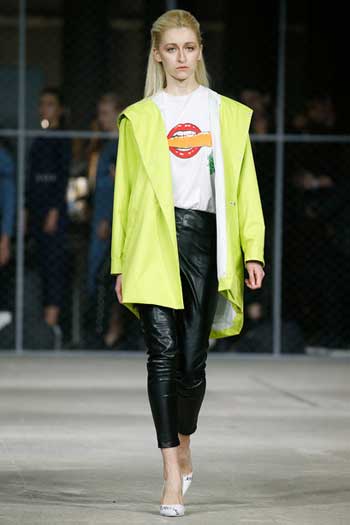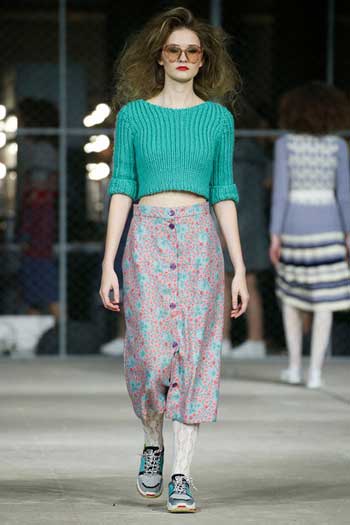FW
The 34th International Cotton Conference Bremen was held in Germany from March 21 to 23, 2018. More than 500 participants from almost 40 countries exchanged views on the latest trends in the natural raw material.
This year, the conference developed into a whole week of diverse events around the entire cotton supply chain. With the focus on Africa, the emerging continent, which also has a special significance for cotton, became the center of attention. The keynote session gave participants an overview, with an informative analysis of the current cotton situation. The marketing of cotton and changing consumer habits in a globalised and digitalised world were the subject of lectures. There was a look at the raw material from a stock market perspective.
Digitalisation is also a cross-cutting issue that runs through the entire supply chain of the cotton industry. One session emphasised the importance of digitalisation for the industry. This enables new approaches in cotton cultivation and textile processing and also influences consumer behavior and thus the necessary changes in the textile industry. The focus is on the status quo of the implementation as well as the opportunities and risks of digitally controlled, vertically integrated procurement and sales processes and the associated challenges at retail level.
Forty-four African countries have signed an agreement establishing a free trade area, seen as vital to the continent's economic development says the head of the African Union. Moussa Faki Mahamat, Chairperson, AU Commission says the agreement establishing CFTA (African Continental Free Trade Area) was signed by 44 countries. The creation of a free trade area billed as the world’s largest - comes after two years of negotiations, and is one of the AU's flagship projects for greater African integration.
However, other economic powerhouses South Africa, Kenya, Morocco, Egypt, Ethiopia and Algeria known for strict protectionist policies restricting imports and exports. The agreement will still have to be ratified at a national level, and is only due to come into force in 180 days.
The full list of countries which did not sign the agreement is not yet available, however, Nigeria is a notable absentee after President Muhammadu Buhari pulled out of the launch in Rwanda saying he needed more time for consultations at home. Nigeria, one of Africa's largest markets, hesitated after objections from business leaders and unions a sign that getting the deal through scores of national parliaments may face several hurdles.
Albert Muchanga, the AU Commissioner for Trade and Industry says that some countries have reservations and have not finalised their national consultations. But it shall have another summit in Mauritania in July where countries with reservations sign is expected.
India will revive the free trade negotiations with the European Union (EU). As many as 16 rounds of negotiations took place between the two sides for the proposed FTA from 2007 to 2013 before formal talks were stuck.
Differences have persisted on the broad contours of the proposed FTA, including the EU’s insistence that India cut import duties on auto parts and wine and strengthen its intellectual property rights regime and the Indian demand for more liberalisation in services and greater flexibility on data privacy. India also feels the flexibility shown by it in further opening up to foreign investments in more than a dozen sectors should be considered positively by the EU.
The EU — including the UK — made up for 17.6 per cent of India’s goods exports in the first ten months of the current financial year. Garments were India’s biggest export segment, followed by engineering goods and gems and jewelry. Similarly, the country imports capital goods and gems and precious stones worth billions of dollars from the EU.
Access to the EU market is crucial for a number of Indian sectors, especially textiles and garments and information technology. Similarly, India is a lucrative market for European auto and pharma companies.
Jayashree Textiles is staring at a sharp fall in profits in the current fiscal. One reason is the dumping of Chinese products in the Indian market. Pre-GST, Chinese players had effected a 23 per cent price drop, which made the company's products uncompetitive in the domestic market. Post-GST, Chinese imports get a 15 per cent offset in the value chain which takes the effective drop in selling price to 38 per cent.
The manufacturer of linen yarn and fabric as well as merino wool is expecting a steep fall in Ebidta margins between 2015-16 and 2017-18, particularly after the implementation of GST.
Jayashree Textiles, part of the Aditya Birla Group, is India’s top linen manufacturing company. It sells in over 50 countries and is the only integrated linen factory in the country with state-of-the-art facilities equipped with the latest spinning, weaving and finishing systems from Switzerland and Italy. Jayashree runs the Linen Club brand of stores, which sell the company's apparel and yarn. Linen Club is on an expansion mode across the country. There are 180 Linen Club stores in the country. The plan is to add 30 to 35 stores each year. All the stores are run on a franchisee basis.
The US-China trade war of slapping tariffs on each other’s imports, on the surface, the disruption could be seen as a disaster for other countries in Asia. A blow to Chinese exports could ripple through the supply chains that stretch across the region, robbing other economies of growth opportunities and jobs.
At the same time, a US-China trade war will spill over into another ongoing economic battle -- the one between China and its low-wage competitors in global export markets. For many emerging economies, the long-term benefits might well outweigh the short-term damage.
China, the world’s largest exporter, has long been the destination of choice for US and European companies looking to outsource and offshore manufacturing, especially of labor-intensive consumer goods such as clothing, footwear and electronics. As factory wages in China have risen to the highest in emerging Asia, however, other developing countries with lower costs have begun to steal away investment and jobs, helping to promote industrialization and boost growth at home. Apparel and electronics manufacturers, for instance, have already started diversifying production to rivals such as Vietnam and India.
Vietnam has been enjoying an export boom, led by sectors traditionally dominated by China, including clothes and mobile phones.
Egyptian cotton is the preferred option for towels and bedding among American consumers. This is among the findings of a survey commissioned by the Cotton Egypt Association (CEA). When consumers were asked to arrange a list of cotton brands in order of perceived quality, 89 per cent placed Egyptian cotton as one of their top two choices. Pima made the top two in 45 per cent of selections, followed by Turkish cotton, Supima and Sea Island Cotton.
CEA takes measures to root out dishonest manufacturers and counterfeit goods from the supply chain. Egyptian cotton is the most recognized cotton brand in the United States. Egyptian cotton is also the name most people associate with quality and the cotton fiber they say they are prepared to pay a premium for. While 86 per cent of those questioned couldn’t name a brand of cotton, among those who could, 95 per cent cited Egyptian cotton, with the remaining five per cent naming Pima.
For 52 per cent consumers, texture is the most important consideration when buying a cotton product and only two per cent consider products being manufactured in the USA as an important factor, when asked to rate the importance of listed qualities.
The fundamentals for the US textile industry are sound. This is true even though some markets for US textiles and apparel were soft last year. The industry’s commitment to capital re-investment and continued emphasis on quality and innovation make it well-positioned to adapt to market changes and take advantage of opportunities.
Any sluggishness is due to factors beyond control, such as disruption in the retail sector caused by shifting of sales from brick and mortar outlets to the internet. Of the US exports of apparel and textiles last year, fabrics made up the largest portion of exports at 31 per cent. Cotton, wool and fine animal hair followed, accounting for 21 per cent, while apparel was 20 per cent. Man-made fibers were 15 per cent of exports, and home furnishings and non-apparel sewn products accounted for 13 per cent.
The United States is especially well-positioned globally in the fiber, yarn, fabric and non-apparel sewn products markets; it was the world’s fourth largest individual country exporter of those products in 2016. Among the top three export markets for US apparel and textile goods were Mexico, Canada and China. Exports to NAFTA countries in 2017, accounted for 41 per cent of the total. The next largest share went to Asia, 30 per cent of the total.
Uzbekistan is ready to take its textile manufacturing capabilities to the next stage by investing in latest technology for downstream processes of fabric manufacture, finishing and make-up. The country is already a strong producer of raw cotton and yarns. It has signaled its intent to foster advances in both technology and the range of activities by its textile manufacturers.
The fact that Uzbek currency is now convertible for international exchange is the foundation for a significant increase in foreign trade. Uzbekistan continues to take consistent steps aimed at developing its textile industry. The country intends to implement 132 investment projects in the textile industry, half of which will be financed through foreign investments and loans, by the end of 2019. In particular, 112 modern, high-tech industrial factories will be created and 20 operating capacities will be expanded, modernized and technologically upgraded. All this will increase the export potential of the industry up to 2.5 billion dollars a year and create more than 25,000 jobs.
Uzbekistan is the world’s sixth largest cotton producer. It is taking steps to increase the volume of cotton fiber processing. A textile factory is coming up. The factory will annually produce 10,000 tons of polyester fiber, 10,000 tons of polyester yarn, 20 million running meters of mixed fabrics and 7,000 tons of blended linen.
VF Corp is committed to improving the lives of apparel and footwear industry workers and their communities around the world.
The company’s Responsible Sourcing program is a global collaborative approach to sourcing products responsibly, including collaborating with industry partners and multi-stakeholder organizations across 50 countries to maintain safe, healthy environments for workers, manufacturing products responsibly, and improving workers’ lives.
An integral component to VF’s Global Supply Chain organization, the Responsible Sourcing program ensures VF’s more than 1,000 contract suppliers and sourcing partners are operating with the same high standards VF sets for its owned and operated manufacturing operations. VF shares with its supply chain partners the company’s manufacturing best practices and knowhow, and often serves as a consultant to help them continually improve their operations and environmental and socially responsible initiatives.
VF Corporation is changing to a circular business model. Consumers come back with lightly used jackets, shoes, clothes, and they get some type of incentive to purchase something new. VF takes those products and, through a third party, cleans, resells, and recycles them. VF, based in the US, is an apparel, footwear, and accessory company and has more than 1,500 owned and operated retail locations around the world across its brand portfolio. The company has found that every time a retail store has such a program, traffic to that store goes up, the conversion rate goes up, and the average retail sale goes up.
Aizel.Ru Internet Store and Mercedes-Benz Fashion Week Russia have joined hands to support emerging Russian designers.
Starting March 10, 2018, Aizel.Ru will become the main platform for sales of local brands, presented at the shows of the key fashion event this spring. Over 100 emerging Russian designers will get a chance of being presented at the internet site.

Aizel Trudel has long been cooperating with dozens of Russian designers. However, giving hundreds of new designers a chance of getting through, Aizel. Ru will become the largest RuNet-based platform across the globe to present Russian fashion. It believes its cooperation to be an education project for emerging designers, for whom the internet should become a key channel of promotion.

Aizel.Ru will support brands with its expertise in the fashion e-commerce sphere. The marketplace will help designers with professional shooting of their collections and will offer support right after they enter the platform and while they use it.

Aizel.Ru is the first Russian fashion marketplace, a member of the Aizel Group, an internet store selling clothes and shoes for women, men and children, as well as accessories and cosmetics of the top global brands. This unique totally Russian fashion project in the online retail sphere has been operating for over 17 years. Aizel.Ru presents fashion trends in both the premium luxury category and in a more affordable segment, and offers brands popular among progressive youth, too. In particular, the store features brands such as Gucci, Burberry, Valentino, Dolce & Gabbana, Balenciaga, Alexander McQueen, Stella McCartney, Christian Louboutin, Marc Jacobs, Victoria Beckham etc.













